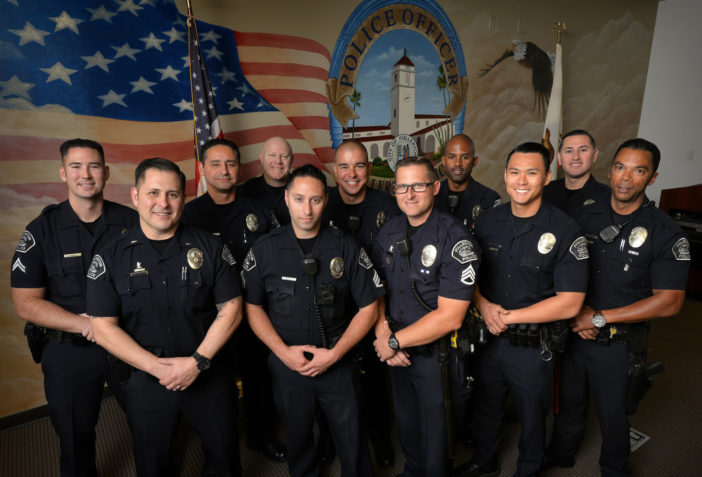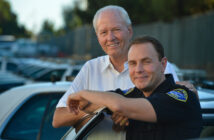Spend time with someone in a car for 12 hours, and you get to know him or her.
Do it three times a week for a month or longer, and you really get to know each other.
Sure, field training officers (FTOs) may be skilled in the art of shooting the breeze with their partners while on patrol.
But their importance to a police agency can’t be overstated.
“I believe the FTO program is one of the most important within our department, because we’re basically training the future,” says Lt. Thomas Oliveras, coordinator of the Fullerton PD’s FTO program.
Two sergeants, Jon Radus and Pedram Gharah, serve as FTO supervisors and Cpl. Donny Blume keeps the team informed of prospective new hires as head of Personnel/Recruiting for the FPD’s Professional Standards Bureau.
“The influence that an FTO has on new officers is probably 10 times more than when I started here in 1992,” Oliveras says. “In those 24 years, the position has evolved and become more vitally important because of the challenges of contemporary policing.
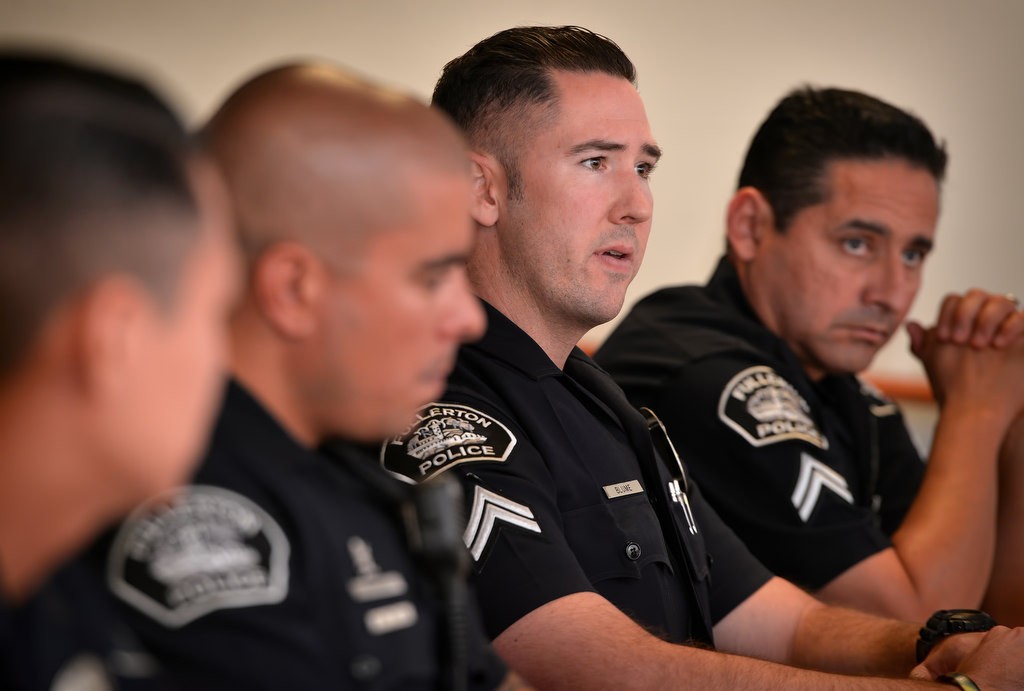
Fullerton PD Cpl. Don Blume, third from left, during a Field Training Officer meeting at police headquarters.
Photo by Steven Georges/Behind the Badge OC
“The FTOs are the first contact with our new officers,” Oliveras continues. “Recruits learn the basics in the academy, but when they get into the FTO program it is basically not only learning ‘The Fullerton Way,’ but how to become professional police officers.”
On a recent weekday, Oliveras, Radus and Gharah ran the regular monthly FTO meeting, discussing such issues as the importance of completely filling out DORs (Daily Observation Reports) and the prospect of soon using software and getting iPads to track the progress of their new recruit police officers.
The Fullerton PD’s team of FTOs — Cpl. Joe Torres, Cpl. Jim Blatney, Cpl. Jose Flores, Cpl. Eric Bridges, Officer Richard Gibson, Officer Ricky Reynoso and Officer Denny Bak — currently lug around huge three-ring binders packed with paperwork that meticulously records the progress of recruits fresh out of the academy or officers who laterally transfer from other agencies to the FPD.
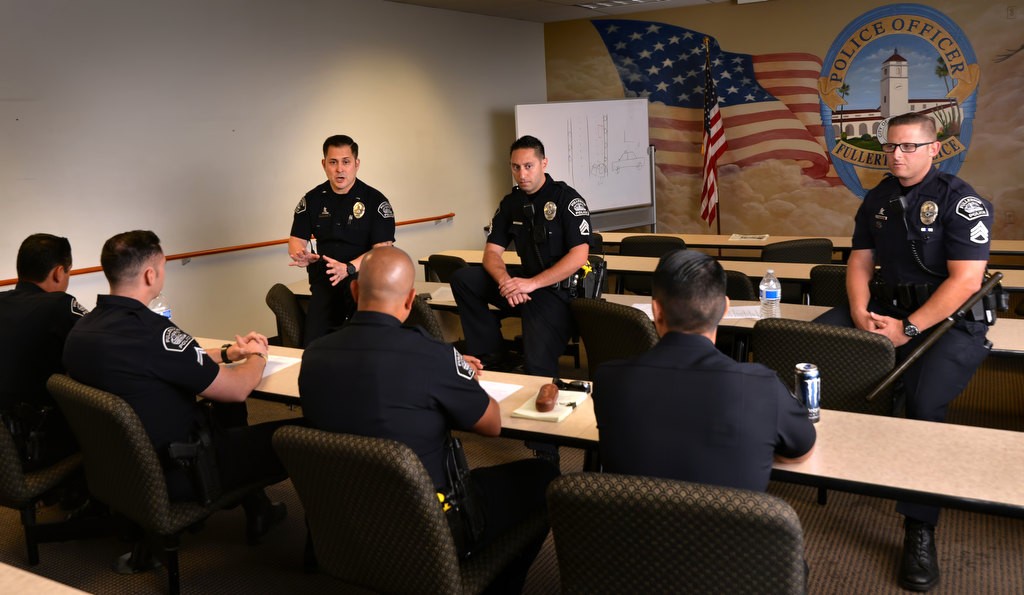
Fullerton PD Lt. Thomas Oliveras, left, Sgt. Pedram Gharah and Sgt. Jon Radus conduct a Field Training Officer meeting at police headquarters.
Photo by Steven Georges/Behind the Badge OC
When a new cop comes to the FPD, he or she is required to partner with an FTO for 12 to 16 weeks before going out solo on patrol.
The process is broken down into three phases, with each new officer getting a different FTO for each phase.
A year ago, Oliveras says, the FPD tweaked the program to allow FTOs to get to know their recruits before they go through the rigorous six-month Orange County Sheriff’s Regional Training Academy.
Now, FTOs spend time with prospective new FPD officers during a three-week pre-academy held at station headquarters on Commonwealth Avenue.
“I want our FTOs to know exactly who their trainees are going to be,” Oliveras says.
Gibson is one of the FPD’s most experienced FTOs, with 15 years under his belt. He has been an FPD officer for 22 years.
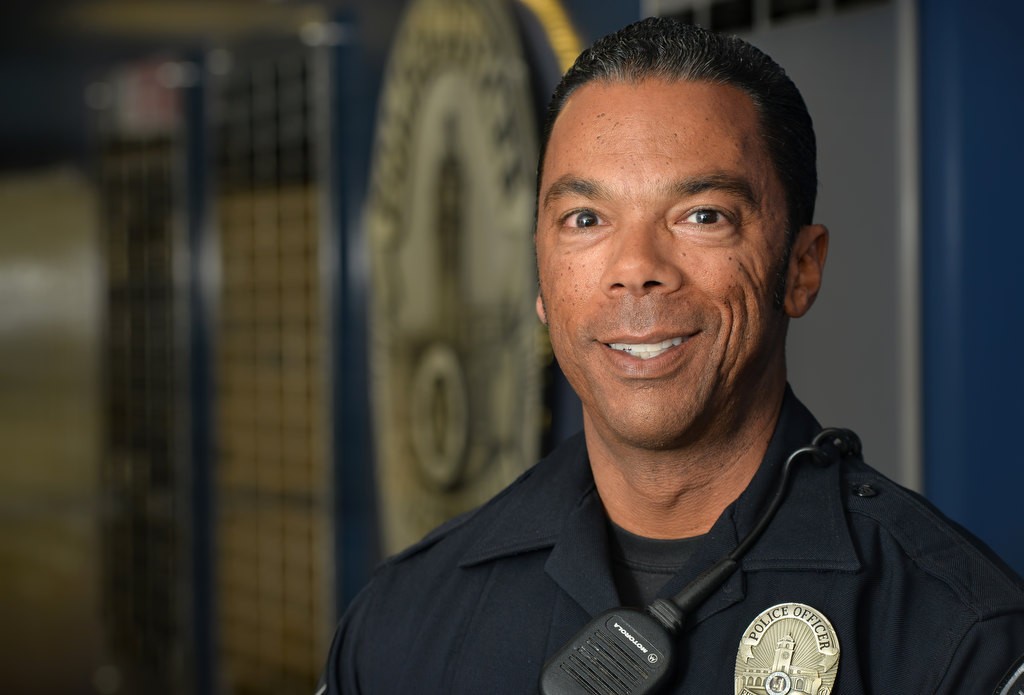
Field Training Officer Richard Gibson of the Fullerton Police Department.
Photo by Steven Georges/Behind the Badge OC
“I enjoy training,” says Gibson, 51. “I have a perspective on how I think a police officer should be perceived, meaning the professionalism, the trust. I really like engaging with the community, talking to people, and I believe the more support we have in the community, the more we are respected.
Gibson figures he’s probably trained about 100 cops, give or take.
“Patience is a key requirement,” he says of the job of FTO. “And you have to have the personality to adapt to the learning skill set of the trainee. That’s huge. No two people learn the same way, so I think it’s important for the trainer to understand and recognize how their trainee receives information and be able to adjust to that style. Not everyone has that quality.”
Reynoso, 31, is one of the newer FTOs. A full-time officer for the FPD for 6 1/2 years who started as a cadet eight years ago, Reynoso became an FTO in January.
“The reason I became interested is I got to a point where I felt comfortable doing the job as an officer, and I started to informally help some of the newer officers on different calls,” says Reynoso, who had worked on the downtown ECHO unit for a year and a half and has been on the SWAT team for about two years.
“Being on SWAT gave me a confidence boost on how to be safer on the street and tactically sound, and so I felt I was ready to be an FTO,” Reynoso adds. “With all the training I’ve been fortunate to go through and the specialties I’ve worked, I think I’ve increased my knowledge and feel I can be a positive role model and lead these new officers in the right direction and teach them our two main goals: provide excellent customer service to Fullerton residents and get home safely.”
With the recent approval for five new officers by the Fullerton City Council, the FTOs will continue to be busy as usual. In addition, five recruits currently in the O.C. Sheriff’s academy are expected to graduate by the end of the year. And in April, two other recruits went through the FPD’s pre-academy.
Oliveras describes his agency’s FTO program as very demanding and rigorous.
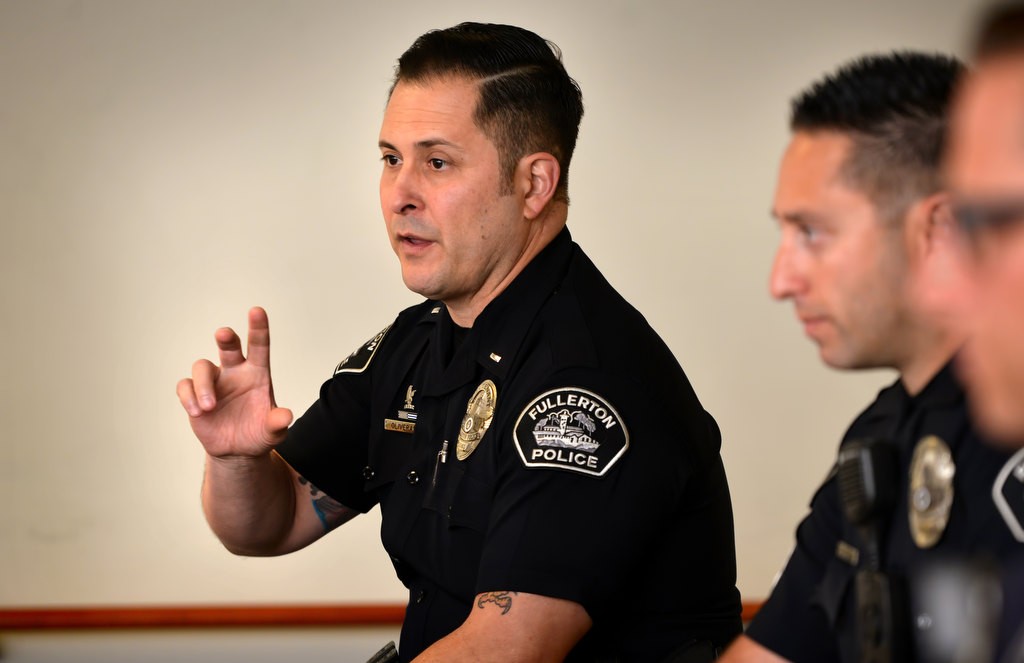
Fullerton PD Lt. Thomas Oliveras talks to the officers during a Field Training Officer meeting.
Photo by Steven Georges/Behind the Badge OC
“We want them (new officers) to learn all the good habits — never any of the bad habits,” he says. “We don’t want them to take shortcuts. We have high expectations as a department, and every FTO takes that responsibility very seriously.”
Asked to describe “The Fullerton Way,” Oliveras says: “It’s the culture of our department. I would describe it as professional, very proactive – we really want to teach the recruits how to be police officers and good investigators.
“Most importantly, we want to teach them how to do thing right always. And we want to make sure the people we hire can perform under stress — we only want the best.”
Gibson says he’s seen the Fullerton PD’s FTO program dramatically evolve over the years.
“We’re more patient now,” Gibson says. “Not that my trainers weren’t patient, but that was a different generation of officers back then. And we not only reinforce what the academy has taught them, but also policies and procedures that our agency sets, which sometimes are way more strict than required by law. I don’t think a lot of new officers realize that when they come here.”
Gibson says he relishes continuing as an FTO for the remainder of his career.
“I’m loyal to our agency, I love working here and I’m always concerned about the reputation of our agency,” he says. “And if I can add to bettering our reputation, great. I think this (being an FTO) is my mark on this agency.”
 Behind the Badge
Behind the Badge
